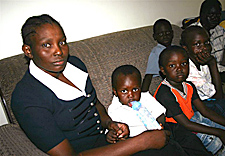 Nyanuer Agang lost all hope the moment her husband's life support was switched off four weeks ago.
Nyanuer Agang lost all hope the moment her husband's life support was switched off four weeks ago.
On Saturday, 4 February, her husband died at Westmead hospital from critical head injuries leaving her a widow with four children under ten years old and two extended family members to support.
Koul Agang, 28, had been walking home five days earlier when he was set upon by youths in Auburn, receiving a fatal blow to the head.
A teenager has been charged with murder and refused bail.
Fleeing persecution in war torn southern Sudan, the Christian family arrived in Australia as refugees only four months ago.
Civil war has been raging in southern Sudan since 1984 and is part of a greater conflict that has gripped the country for more than 40 years. During that time an estimated two million people have died and four million have had to leave their homes.
A further two million people have sought refuge in camps and other countries.
After surviving the hardships of war and refugee camps in Khartoum, Mrs Agang never expected that the country that finally offered freedom and safety would be the place where her husband would be killed.
As Mrs Agang weeps, her children play upstairs in their Granville home, too young to fully understand the impact of their father's death.
Talking through an interpreter, she says her husband was a good man in so many ways, a quiet man who was a good provider and cared for his family.
She says that every day without fail he would take the children to the station on their way to school and walk there every afternoon to greet them when they returned.
Since the incident, Anglicare has provided support to the family through emergency relief and their Anglicare Migrant Services Sudanese Refugee Project worker at Marrickville, Angelo Cawuop.
Members of the Sudanese community have been offering the family counselling, prayer and material support.
Mr Agang was the only one in the family who could speak English and their sole income earner. As such the family is now facing eviction as they can no longer afford the rent.
"I cannot believe such a thing can happen in Australia," Mr Cawuop said. "It is terrible to have survived so much hardship in the Sudan and have this tragedy happen here.
"It has also created a real sense of uncertainty in the Sudanese community. They endured difficulties because they always believed that things would be better in Australia " that they would be safe. Now everyone is worried about their future."
In 2004-05, 13,000 refugees and asylum seekers came to Australia. More than 8000 are from Africa, including Sudan, Burundi, Democratic Republic of Congo, Ethiopia, Sierra Leone and Liberia.


























